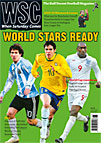 Greg Norman explains why both political and sporting reforms are needed in South America's poorest country
Greg Norman explains why both political and sporting reforms are needed in South America's poorest country
Despite playing at La Paz’s atmospheric Estadio Hernando Siles, the world’s highest international venue, the national team is, at 67, the lowest ranked South American side. Meanwhile, a league whose second most successful team in history is called The Strongest is, unsurprisingly, statistically the continent’s weakest in recent years. The last 16 of this year’s Copa Libertadores featured teams from eight different countries, yet Bolivian teams Bolívar and Blooming finished bottom of their groups with five points between them.
Disappointing international results are not new. Since the pinnacle of an appearance at the 1994 World Cup, the selección’s qualification campaigns have steadily worsened and no Bolivian team has negotiated their way out of a Libertadores group since Bolívar reached the quarter-finals in 2000. What is new is the extent of the malaise and the huge physical and technical shortcomings of Bolivian teams. The national football federation (FBF) is currently petitioning FIFA with an international study that proves there is no health risk of playing at 3,637 metres above sea level.
Yet international and continental results in La Paz of late do not reveal it as the advantage or fortress it was, while winning away does not even seem to be countenanced. This bleak landscape has prompted calls for radical change in the entire structure of the domestic game, with claims that the three rival bodies running football are an inscrutable closed shop with the same old faces in charge. Leading figures are now pushing for intervention from the state.
When the team’s hapless qualification campaign for South Africa ended in acrimony and the squad in mutiny, the country’s president Evo Morales declared that football had been “controlled by private, autonomous entities” and that nationalisation would “dignify” the national team. Seen more often in football shorts than a suit, Morales’s first political post was as the sports secretary of the coca farmers’ union. Yet during a presidential tenure that has seen the nationalisation of key industries such as oil and gas, sport has been largely unaffected. The government official with responsiblity for sport has little influence over the bodies that wield the real power in the game.
The FBF, which has responsibility for the national team, is headed by Carlos Chávez, an economist who is currently leading Bolivia’s fight on the altitude issue. He is seeking re-election in July and is currently rejecting calls that he explain the financial dealings of his previous term as president of Santa Cruz club Oriente Petrolero. The Liga de Fútbol Profesional Boliviano (LPFB) oversees the country’s 12-team top division and there are also nine regional associations. Real control currently lies with the LPFB which negotiates sponsorship rights and releases players to a national side increasingly reliant on the domestic league.
Conflicts are regular. In March several teams were reluctant to release their players for a mid-season friendly against Mexico that some said was arranged simply in order for the FBF to earn a reported $100,000 (£67,000). Several players pulled out through injury and a 5-0 drubbing ensued. Clubs are also accused of short-sighted administration, often reacting to poor performances by changing manager, bringing in foreign or veteran players on excessively high salaries and not investing in developing youth.
Bolivia is the poorest country in South America, yet players such as Bolívar’s Uruguayan striker William Ferreira reportedly earn $10,000 a month, a fortune by local standards. Such salaries also exact economic havoc on the clubs. Barely a month goes by without the threat of a players’ strike over unpaid wages. One such action in March forced the resignation of Orlando Jordán as president of Cochabamba’s Wilstermann, unable to cover a deficit of $400,000.
Juan Carlos Costas, a veteran radio commentator, is one of the most vocal advocates of a root-and-branch overhaul of the game, suggesting an interim governing body takes temporary control to appoint of a single head of Bolivian football. Former internationals would constitute the bulwark of the new organisation and the focus would be on grassroots development to bridge the huge technical gap, ensuring that new talent is brought through rather than what some see as a reliance on veterans and naturalised foreigners. Costas cites Venezuela, once Conmebol’s perennial wooden spoon winners, as a good example of how strategic state investment at the grassroots level of the game has, over the last ten years, seen an inexorable improvement in the results of the national team.
The need for a more active political role in sport appears to have been noted. Morales is set to announce a new sports role which will be taken up by Marco Etcheverry, one of the country’s greatest players and he of the memorable six-minute cameo in the 1994 World Cup opener against Germany. But with mediocre fare on the field and an established hierarchy off it, international competitions may remain something for Bolivian teams, as a recent Viva Sports headline said, “to look at, but not touch”.
From WSC 280 June 2010